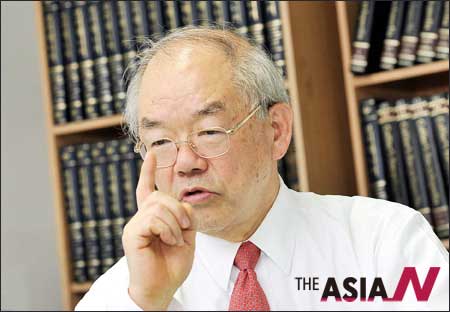‘I object to faculty’s sense of privilege’
KAIST chief dismisses professors’ claim about patent theft
Suh Nam-pyo, president of the Korea Advanced Institute of Science and Technology (KAIST), said Friday that he won’t succumb to pressure from the professors’ council.
““The professors’ council has told me to quit and leave this school. But I won’t do so. I’ll fight on,” the 76-year-old Korean-born naturalized American told The Korea Times during an exclusive interview.
The former MIT professor is engaged in a prolonged confrontation with some faculty members over a variety of issues ranging from his alleged theft of a patent from a professor to a string of student suicides.
He dismissed allegations about the patent theft, saying the professors are spreading unfounded rumors to get him expelled from the school. He was cleared of the theft allegations after a police investigation prior to the interview.
The council alleged that the patent in question was developed by a professor conducting a Mobile Harbor Research Project.
The school asked police to investigate the case in March, and last week officers said that there was no evidence proving the professors’ allegations.
The professors are also upset by new tenure rules and a merit-based pay system, the centerpiece of his reform programs aimed at enhancing the school’s research capabilities.
Based on strict tenure track examinations, the school plans to choose the first batch of professors who won’t get tenure, which was previously unimaginable in colleges here.
“Professors wield great power. They think they are privileged. It is a matter of culture in Korean universities. I’m trying to change such culture,” Suh said. “My predecessor Robert Laughlin had to quit early amid a struggle with disgruntled professors. Such an unfortunate thing should not happen again.”
He condemned the council for making a politically-motivated attempt to shake his leadership, saying behind the negative campaigning are a group of professors who are afraid of changes he is bringing to the school. Suh was chosen as KAIST president in 2006, and secured another four-year term in 2010 despite protests by the professors.
The council claim that a growing number of professors as well as students have turned their back on Suh because they were unhappy about the way he manages the school. Five students and a professor have committed suicide since last year, which it
alleges were the result of Suh’s reckless push for restructuring.
Suh, however, said the professors have used the case to defame him.
“The suicides are the most heart-breaking tragic event of my life. I still cannot fathom the depth of despair that drove them to end their precious life,” Suh said. “Each sad event seems to have its unique cause, but it is not a subject for public discussion. We should respect and honor those who are not here with us anymore. We all should avoid turning any tragic incidents, let alone suicides, into the politics of interest.”
Suh said his goal is to make KAIST one of the top 10 universities in the world. To that end, he is seeking collaboration with global companies, including General Electric (GE).
He revealed that GE Chairman Jeffrey Immelt proposed a joint research project with KAIST and any Korean firm that Suh chooses.
“At a private dinner in Seoul, he proposed that GE, KAIST, and one of the major Korean companies work together to develop a major engineering project,” the president said.
“It seemed that he was interested in our On-Line Electric Vehicle and Mobile Harbor projects, although he did not specifically say so. He proposed that GE would invest $5 million, and asked KAIST to get a Korean company do likewise, as well as seek the support of the government.” <The Korea Times/Na Jeong-ju>


























































